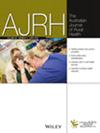‘They got my back’: Thematic analysis of relationship building in nurse home visiting in Aboriginal communities
Abstract
Objective
The client–practitioner relationship is the cornerstone of nurse home-visiting programs. Little is understood about how relationship-based maternal and early childhood health care is perceived by women in remote Aboriginal communities. As part of an evaluation of nurse home-visiting in the Northern Territory, this research examines how relationships are established with clients, and what elements are valued most by women.
Setting
Maternal Early Childhood Sustained Home-visiting (MECSH) is an Australian model of nurse-led home-visiting targeted at women facing adversity who need extra support. The model provides parenting information, health education and psychosocial support during pregnancy and the first 3 years of children's development.
Participants
Interviews were conducted with 92 Aboriginal women and 11 practitioners including nurses, social workers and community workers.
Design
Qualitative semi-structured interviews were conducted with convenience samples of MECSH clients and practitioners. Data were analysed using a two-step process of structural coding and thematic analysis.
Results
Trust was the foundation of clients' positive perception of the relationship with their MECSH provider. Relationships took time to develop, often beginning with practical support to meet clients' basic needs. Practitioner dependability and flexibility to client priorities, communication, confidentiality and being helpful to the woman and her family was important. Clients emphasised emotional support and friendship.
Conclusion
The relationship-based approach was valued and consistent with culturally safe and trauma informed ways of working with Aboriginal families. Effort is required to commit to the model to address ongoing healthcare engagement and health outcomes in remote Northern Territory communities.

 求助内容:
求助内容: 应助结果提醒方式:
应助结果提醒方式:


